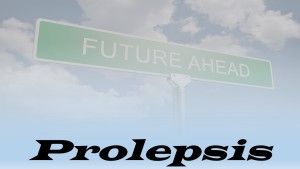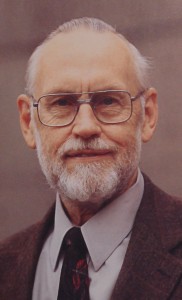What path are you on? Where is your life taking you?
The previous post ended with a look back. In this post we’ll turn around and look ahead.
 Many people would do well to become familiar with a little-used English word: prolepsis. According to Britannica, a prolepsis is “a figure of speech in which a future event is referred to in anticipation. For example, a character who is about to die might be described as ‘the dead man’ before he is actually dead.”
Many people would do well to become familiar with a little-used English word: prolepsis. According to Britannica, a prolepsis is “a figure of speech in which a future event is referred to in anticipation. For example, a character who is about to die might be described as ‘the dead man’ before he is actually dead.”
To live a proleptic life is to live in the reality of the future, to live as if the future were present. The Bible calls us to live in today’s world with a view to tomorrow’s unseen world.
For this light momentary affliction is preparing for us an eternal weight of glory beyond all comparison, as we look not to the things that are seen but to the things that are unseen. For the things that are seen are transient, but the things that are unseen are eternal, (2 Corinthians 4:17-18 ESV).
We are to live today in the reality of the coming of the kingdom of God. Our lives in the already are to reveal the not yet of the coming kingdom.
But what does that look like? What daily difference does a proleptic outlook make in your life?
Here’s one difference: you walk away from folly and move toward wisdom.
Both wisdom and folly want you on their path!
Both wisdom and folly call us to join them on a path. Wisdom calls us to life; folly, to death.
Wisdom seeks to discover the end God intends—the kingdom of God—and to walk on the path toward that end. Folly, on the other hand, blinds itself to the end. It wanders from the way and finishes somewhere else. Folly cannot see the kingdom of God. (“Unless one is born again he cannot see the kingdom of God,” John 3:3 ESV.)
“Eat, drink and be merry,” folly calls to us. “Tomorrow you die, so enjoy today. Don’t think about the future. Give no thought to where you’re going.”
But folly deals out bad advice. As Proverbs 14:8 states, “The wisdom of the prudent is to give thought to their ways, but the folly of fools is deception.”
Proverbs 8:32-36 puts things more starkly.
Now then, my sons, listen to me; blessed are those who keep my ways. Listen to my instruction and be wise; do not ignore it. Blessed is the man who listens to me, watching daily at my doors, waiting at my doorway. For whoever finds me finds life and receives favor from the Lord. But whoever fails to find me harms himself; all who hate me love death.”
Those who love wisdom, love life! The fool, however hates wisdom and thus carelessly loves death.
 Stanley Jones (1884-1973) was a Methodist missionary to India whose ministry eventually became international in scope. His 29 books included The Word Became Flesh, in which he writes the following:
Stanley Jones (1884-1973) was a Methodist missionary to India whose ministry eventually became international in scope. His 29 books included The Word Became Flesh, in which he writes the following:
I am convinced that we are predestined by the very structure of our beings to be Christian. Note I say “to be Christian,” not “to be Christians,” for many of us who are “Christians” in the conventional sense are living against the laws of their beings and are thereby being destroyed, maybe slowly, but surely. … I believe that predestination is written … in our nerves, our blood, our tissues, our organs, our makeup. It is not merely written in the texts of Scripture, but into the texture of our beings. … We can live against that destiny if we desire, for we are free, but if we do we get hurt—automatically. When Christ made you and me and the universe, He stamped within us a way – a way to live. His way; and if we live according to that way, we live; if we live some other way, we perish.
Jones is saying that we were made to be Christian (i.e. to have a relationship with the living God) which is different from being a Christian (a member of a religion). God designed us to be in relationship with him. This design has been built into our nerves, our tissues, our organs. We can live against that destiny if we desire. We can choose another path, because there are two paths. But the path of wisdom is the path we were designed to walk on. We have a choice to make.
Think about the path you’re on
There is a choice. There are two paths with two different ends.
Lady wisdom calls, “Come, walk on this path. This is the path of life. This is the path for which you were designed. This path will take you to life, to flourishing.”
The woman Folly, says, “No, come to my house.” She would seduce us to another path, a path we were not designed to walk. We are free to choose this path. But it leads to death and destruction, to poverty and slavery.
The fool lives as if history has no meaning. There is no tomorrow, there are no creation laws. Fools live as if their design as a human being has no meaning.
If you want to end your journey in the kingdom of God, you will need to pursue wisdom. If you do not care where you are going, you will likely listen to folly and find shame.
Where do you want to go? Are you on a path that will take you there?
Where is the path you are on taking you? Are you sure that’s where you want to end up?
From a forthcoming book






